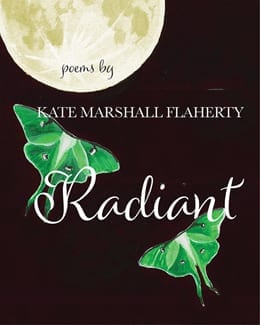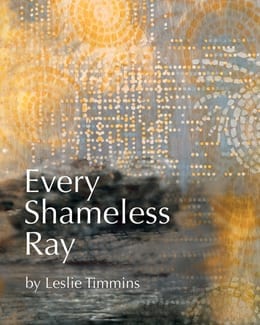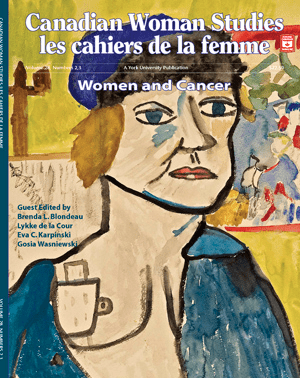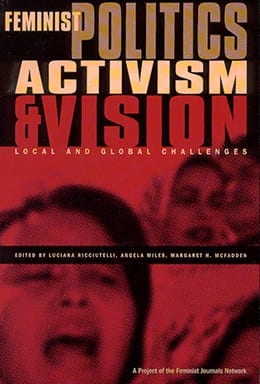Radiant is a poetic exploration of one hopeful person’s healing journey through cancer—from missed appointment, to mammogram, to diagnosis, to surgery, chemo, and radiation, through hysterectomy, genetic testing through to wholeness. Kate Marshall Flaherty’s luminous poetry is raw, honest yet radiant and life-affirming. The poems are chronological, yet timeless; they are courageous and graphic, yet tenaciously realistic and positive. These poems are unflinching in their exploration of “fear, death, the whole shebang.” They vary in form from odes to eulogies, from free verse to prose poem to “notes to self,” “welcoming angels,” “lighting up the night,” voicing, blessing, questioning, raging, and eventually settling into a radiant space, of acceptance and gratitude.
“Kate Marshall Flaherty’s Radiant inspired by her cancer journey challenges us to confront our own mortality and to live in the now of each sacred moment. Visceral, gut-wrenching yet affirmative, her luminous, courageous poems uplift and hearten us even as she tastes the bile rising from somewhere sterile and white, dreads chemo’s red-electric juice stung into my veins, and blisters from a medical sunburn. Daring to ask, Am I a burnt offering, she glows with love for her family, friends and valiant self, worthy of the medal of honour she pins on her own wounded chest.”
—Donna Langevin, author of In the Cafe du Monde and Brimming
“Radiant perfectly encapsulates Marshall Flaherty’s poems about cancer. Her oceanic images describe a pilgrimage which suffuses her tumour with divine light: By the time you saw me – / bright as a silver lure in an ocean mound/ I shone out from darkness // Wanted to be found! (“Tumour”). I will not see cancer as an enemy/ nor foreign intruder (“Welcoming Angels”). Her compassionate cadences, emotionally resonant sound-combos and evocative forms— evidence of poetic mastery—invite the reader on a sacred sojourn. Darkness, as in genetic markers, pain, fear, loss… becomes a light-infused blessing, a spiritual discipline requiring courage, surrender, and faith. The omnipresence of cancer in our time, almost an epidemic, and the poet’s skill and slant make Radiant a must-read for everyone.”
—Katerina Vaughan Fretwell, author of Dancing on a Pin and We Are Malala
“Kate Marshall Flaherty’s collection, Radiant, emanates optimism in the face of cancer. The narrator returns to that positivity often, even after intense fear and anger. In “Welcoming Angels” her narrator refuses “to see cancer as an enemy / nor foreign intruder…” There is even empathy for the disease. But Marshall Flaherty is aware of the journey she’s on. She moves from rational consideration of a family history of cancer to desperate bargaining in “Moon Tides, IV Hysterical” where she insists she does not “…need a womb to love, / only a place / to lay my quarrel down.” Wonder, even at her own process, makes the narrator radiant and perhaps even saves her from the darkness which envelops her as she endures the intensely difficult treatment for breast cancer. Kate Marshall Flaherty rebounds from despair with playful humour, resilience and wisdom.”
—Kate Rogers, author of Out of Place and Foreign Skin








Renée Knapp –
Radiant by Kate Marshall Flaherty
reviewed by Lesley Strutt
League of Canadian Poets – August 13, 2019
http://poets.ca/2019/08/13/review-radiant-by-kate-marshall-flaherty/
Kate Flaherty’s collection of poems in Radiant is an uplifting treatment of one of life’s most excruciating experiences – cancer. Rather than drifting into self-pity, Flaherty finds a moment in almost every poem to celebrate being alive.
When she faces radiation, she says “I envision the radiant sun, / think of its healing rays” or “Envision love and light / emanating from the source of all” (37). She treats chemo as a gift. “And so I will see you / ruby drug / as liquid love – / / trust you are spreading the good news” (17). It takes courage to convert what is poisonous and painful to an expression of love.
It also takes courage to treat recovery with humour. Flaherty’s poem Just a Tich (79) has audiences belly-laughing in their seats. As she describes stroking her newly grown hair, “these soft tassels” (60), she elicits smiles of compassion, laced once again with courage:
I want to stand
on this mountain’s bald top
in the fierce, refreshing wind
waving my flag in the light (60)
There is hommage here, too. For the women who didn’t know that their handling of the paint that illuminated the numerals on clocks would lead to their deaths. For Margaret, the friend “of the red balloons” (31) “of wings and wine” (31) who never “fulfilled / her dream of a wellness studio” (32). Of her own journey, Flaherty writes, “I, too, have known baldness – / known vomit and yellow flesh / baggy as sackcloth” (77).
But through tragedy comes a profound appreciation of her children, her friends, of life itself: “you could go back… to the musicians in the wings, / hug the front of house…your lovely, lonely luscious life,” (89). Cancer is a lonely journey. No one can walk the road but you. I say this as I walk my own cancer walk. But we can lay our “quiver and quarrel down” and forgive, like “the shore forgives / the moon nightly / for ripping her out / to sea and back” (55). Our lives are can be lived “fully here now” (47), “out beyond the what-ifs and could-be’s (74).
Flaherty has gathered together poems that seek to sustain and nourish, poems that clearly have been written with the heart of a warrior. Though she doesn’t call cancer a battle, she has the courage of a mighty heroine in this epic journey to the edge of life and back. Readers of this collection will know they are holding words of deepest wisdom, whether they have experienced cancer or not.
Renée Knapp –
Radiant by Kate Marshall Flaherty
reviewed by Grace Ma
The Trinity Review – November 5, 2019
https://www.thetrinityreview.com/home/2019/11/5/book-review-radiant-by-kate-marshall-flaherty
The first poem of Kate Marshall Flaherty’s Radiant, “Welcoming Angels,” begins with: “I will not see cancer as an enemy / nor foreign intruder, / but a passenger pigeon, (not extinct), / flown from a roof box.” This inaugural stanza establishes and previews the defying and sweetly metaphoric poetics that Marshall Flaherty develops throughout her collection, which intimately guides her reader through her journey with cancer. Her poetics is inviting as it is introspective, a spiritual communication between actors in the life present and the life beyond. “Welcoming Angels” continues by characterizing the pigeon as possessing no “pecking order / (no band ‘round his ankle),” simultaneously granting an agency to the cancer as well as the speaker, the creator of a new world. Ultimately, Marshall Flaherty shows how she approaches her journey of cancer with curiosity, transforming this experience into an opportunity to reveal her love for herself and for others within pain.
Throughout the collection, Marshall Flaherty employs rich, naturalistic imagery to describe her cancer and her body. The sea, the ocean, becomes an organic basis for this exploration into the known and unknown. In “Tumour”, the cancerous narrates in first person, calling itself an “ominous orb… in soft oyster folds.” From this narrative the tumour comes to life as the speaker becomes the helpless “you”, the other. And yet the image of this darkly yet beautiful pearl, almost invites a compassionate admiration, being “bright as a silver lure in an ocean mound.” In “Ode to my Vagina”, the attention of the sea is bestowed upon a vagina that was once “squid-soft” but now “a sand stranded conch.” Marshall Flaherty crafts an intimate detailing of the vagina that is at once vibrantly symbolic and physically visceral. These courageous explorations of the aging body and the body with cancer demonstrates how Radiant pays respect to the metaphoric beauty of the body, or perhaps more genuinely, the metaphoric body of beauty.
Beyond the individual and the individual body, compassion and love for others weave the collection into a whole. In “The magic is in the salt, they say,” Marshall Flaherty’s speaker asks herself, “How can I hold his sorrow?… His first love, sex, heartbreak. / I know salt in the wound / will make his life richer, / how can I tell him this?” These moments of empathetic questioning bring the reader closer to the speaker; although the speaker is ill, we cannot help but feel strength resonating from her, and believe that she would be able to comfort us, too. In “Book of Hours”, observing her son’s “luminous” face lit by an e-Book and the “moon full”, Marshall Flaherty’s asks another question: “What time is it?” The answer is: “It is now, and sacred.” Whether rhetorical or not, the questions in Radiant reveal the speaker’s care for others through their sensitive perceptiveness.
There is a sense, throughout Radiant, that the speaker is continuously transcending her cancer. The cancer is very much present, and real, but it is simultaneously being overcome by the intrinsic and extrinsic will of the speaker. As Marshall Flaherty writes eloquently in “Note to Self”: “Cancer is a maze to self, / a solitary walk, and yet / the sun set shadows directing / my trek, and friends / left crumbs and markers.” Further, in “I will write me a love poem,” the speaker describes herself as “A trinity of me,” and reflects, “I sing myself a song / of my Self, three word / miracle: / I am Love.” With a deeply Whitmanian nod, Marshall Flaherty multiplies her self generously, and the mention of “trinity” automatically evokes the image of her three children. Later in the poem, Marshall Flaherty writes: “Katie… plaiting three strands / me, we, us.” Marshall Flaherty steadily, confidently achieves a union between the self and the collective, the cancer and the body. The result is a reflection on illness that is neither over-defined or diminished within the stream of life, becoming the unexpected intensity of life itself.
With Radiant, Kate Marshall Flaherty spiritually and honestly guides herself and the reader through her journey with cancer. A warm glow wraps her poems, sometimes in a joyous manner, but mostly in a humanizing manner. Radiance, the reader comes to learn, not only comes from the speaker’s strength and love for her family and friends, but also from radiation and from pearl tumours. Within the gratitude evoked in Marshall Flaherty’s narrative comes an acceptance of what is, which is both fixed and ever-moving, known but unpredictable. As the speaker reflects soberly and tenderly: “Will cancer return? Will sunshine / Will drought?”